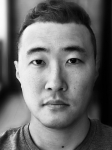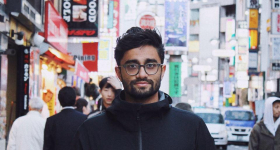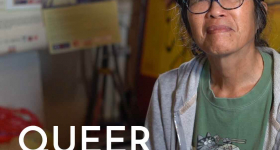EARTHQUAKE
One night my girlfriend asked what was wrong with me and I couldn’t explain. We lay on my black sheets between my blank white walls, on the bed that was the room’s only furniture. We had bared ourselves — we had a connection when we were naked — but Sandra wanted more than full exposure. It was 3 am after her late shift waiting tables at The Cave, and she smelled like fry oil and strangers, and still she talked. Who was I to prefer silence? I told her how I blacked out as I watched the news, ate my microwave dinner, wrote, how I woke to find my status update a string of g’s with no likes, nothing to account for the time between. “It’s not just loneliness, I mean. I’m pretty sure I’m disappearing. People walk straight into me on the street. When I’m alone in a bathroom with 10 urinals, some white guy will come in and pee right next to me.”
She twitched her mouth from side to side. This was a habit I envied. She was always doing things equally on either side of her body.
When her lips parted the smack echoed off the empty walls.
“How long you been feeling this?” she asked. “Like you’re disappearing?”
I couldn’t tell whether she was being sarcastic.
Well. These were the facts: My cat was dead. My wife and daughter had left me. At some point in the last three years I had stopped going out or having friends. After the divorce I had kept the walls blank because the echo was a kind of company.
“Just to clarify,” Sandra said, “you’ve felt like disappearing the whole time you’ve been with me?”
“Just to clarify,” I said, “what I mean is you’re all I have left. Maybe you’re the only reason I’m still here.” I felt quite smart about this line.
“Try again,” she said.
Above us the popcorn ceiling seemed about to shed its puffs. “Okay. Today I went to the butcher shop for bulgogi. I stood in line thinking about how to tell the guy to slice it, and he served everyone else inside and then every new person who came in. He didn’t even look at me.”
Sandra held her finger in front of me, showing off a new burn on her fingertip. She must have gotten it from work that day. The ceiling blurred in the background.
“Tonight,” she said, “one white boy pinched my ass and another tried to tuck his tip under my apron string. I would settle for no bulgogi.”
The room spun.
“After a while,” I said, “my daughter walked into the shop with her mom. They didn’t see me either.”
“I’m trying to tell you something —”
All around us rose the smell of raw beef, the sound of chopping and flirting — a butcher shop was a place of zero subtlety — and then there was my daughter with her lips purple and her hair spiked, in black leggings and silver boots and a camo T-shirt, like this was normal.
Sandra sighed. “You’re in a rough patch,” she said cruelly. “You’ll get out of it.”
I could tell she wanted to say something more. When she turned her head away I thought I had to look on the bright side. After all in the scheme of things, disappearance was literally no thing. I was 36, and I was dating, and my body still functioned, even if my left foot was slightly bigger than my right. I could afford $1,600 a month to rent the first floor of a duplex in a white Boston suburb. It could be worse, etc.
“Plus,” I added, “my agent called. She couldn’t sell my novel. Plus my savings are almost gone. You were right, I shouldn’t have quit my job.”
Sandra sat up and let her hair down over her face like a ghost. “Boo,” she said. “Don’t try to blame me. You’re depressed.”
Why were other people always telling me what I was?
“Anyway” — she waved her hands in my face — “did you forget I went to city hall today to change my name? I want you to say my name correctly when we’re having sex.”
She had my full apprehension now.
“I’m done answering to two masters,” she said. “I mean languages.”
I had known of her plan to take one official name instead of one English name and one Korean — I had just lost track of what day today was.
“Yumi?” I said.
Yumi brushed back her hair, and the ghost shifted to her eyes.
“Do you feel like a single person now?” I asked.
“I never felt like two people,” Yumi said. “It was only other people who acted like I was.”
I wondered whether what was wrong with me was that I was other people.
Once Yumi left, clacking her lacquered nails against the doorframe for luck, I showered and put on the purple tracksuit that I used to wear for my daughter. She had claimed it made me look cool. I met my desk in the purple office that used to be my daughter’s bedroom. I had added as little as I could, only a desk, a chair, a computer. I felt closer to Charlotte in her old space. Regret plus writing was a little like time travel.
From my desk I texted Yumi that I would love her better; I needed to figure out how to do that. I knew “love,” I knew “better.” Somehow their combination stumped me. Before she got dressed, Yumi had said I wasn’t disappearing, I was choosing not to be present. I could see how she could see it like that.
I touched the keyboard and the keys felt hot, as if someone with a lot of excess body heat had just been typing. My fingers felt hot. Maybe I felt hot. I wondered what kind of book people would buy. Two characters who hate each other fall in love? Plus the apocalypse? Plus they’re of different races? I decided to write a new novel. All I needed was 3,000 words a day for a month. Ten thousand words a day for a week? I’d just make something weird happen.
I muffled my mouth with my hands and screamed for a while into them. Then I coughed until I could breathe again. My chair poked into my spine, though nothing stuck out of it. A note on my desk said buy a new chair.
In my failed novel a straight cis able Korean American guy woke, drank coffee, made toast and eggs, hacked into his company’s website, ate a grilled cheese sandwich with four lactose pills, took notes to protect his company from other hackers, microwaved his dinner, watched the news as he dined, slept dreamlessly, again and again — and desperately wanted a different life. He was at an age of dwindling options: Each choice he made limited the choices he had left. In the end he settled for what he had, and his desire vanished. He was finally everything he could be. It was a happy ending.
I was still at my desk, massaging the sore spots on my back and thinking about my options, when my computer shut down. In the apartment upstairs something crashed. The floor swayed. Gravity got confused. My photo of my ex-family danced off the desk, and when I reached out, my hand didn’t go where I intended it to go. I couldn’t make my intention action. My head seemed to float on liquid, and yet I was more aware of the ground than I had ever been. The ground was always in motion — I’d only just noticed. I hugged my knees to my chest and squeezed my eyes shut. I prayed for my daughter in her bedroom across town, yanking her blanket over her head — or was she in school by now, huddled under a desk? — when had the sun come up? — had she eaten? — either way I couldn’t reach her —
This was how I disappeared.
When the floor returned to normal I rubbed the soles of my bare feet over the hardwood. I stomped, paused, stomped a few times more. For the first time the blankness of the walls looked wrong, like something on them had been shaken down. I stomped again, then shuffled out to the TV to hear another human voice.
The living room was the same — what used to be typical was now strange. On one side was my cheap TV, on the other side the red couch my ex-family hadn’t wanted. Beside the TV stood the electric keyboard. Behind the couch a cardboard shipping box.
The whole room looked very haphazard. Only the keyboard seemed intentional. I had bought it after the divorce.
The news didn’t mention an earthquake. Even the local news covered a presidential candidate who kept refusing to denounce the KKK. One pundit said he never condoned the KKK either. How could you tell a person’s stance? My phone got no emergency alert. The movement of the earth went unacknowledged. I googled “earthquake Boston” and learned that tremors in the greater metropolitan area are more frequent than people think. Usually they’re too small to be felt. Once I saw a show about people who vacation wherever they think the next “big one” will hit: Either they hoped the earth would swallow them or they hoped to discover a new earth.
I cracked the front door, and the same old earth eked through the opening. Disappointing. No Minotaur slammed its horns into the house. No hand descended from the sky. No wolf huffed. The world held the same unremarkable terror as ever. The older white straight couple across the street caressed each other on their porch with their terrier barking at their feet. I called out to see whether they had felt anything, and they ignored me. They were your typical neighbors.
In the kitchen I corkscrewed a bottle of Chardonnay, and I drank a quarter, and then another quarter, and then another quarter, until I felt less tired. I tried to keep myself awake, aware. I shook the bottle, and the liquid inside it shook. With each sip the bottle lightened, its weight proportionate to the wine I hadn’t drunk. Consumption was lightness.
I took the wine back to my office and lifted the photo of my ex-family back onto my desk. This time action matched intention — what was different? As always, in the photo, Charlotte wore a purple sundress and chewed her brown hair and clung to her mother’s sunburned leg. As always I wiped my thumbprints off the glass with my thumb. The next time I would have to do it again. I drank the last quarter of wine and then wrote 3,000 words about the earth shaking a person’s sense of the earth.
It wasn’t until I returned to the living room, with the empty bottle in hand and the cardboard box behind the sofa staring back at me, that I realized why I was pacing. It was the box: There was something off about it. In that box were toys my daughter had wanted that I never got the chance to give her. I had bought them, one by one, over my last three years alone. It occurred to me now that the line earthquakes make between the past and the present is called a fault.
I knelt, and the flat wood dug into my knees, which were still indented from the many pews I’d knelt at after my parents died. My adoptive parents had not been the kind of Irish Catholics who went to mass out of faith: They had based their devotion on an hour per week of corrective behavior. I had based mine on wanting to be loved. They had adopted me, and then they taught me how to be adopted — and how to be Catholic and how to be white — and then I left for college, and then they stopped talking to me, and then I got married, and then Jennifer and I had a child, and then I was afraid of myself, and then I could never tell what my family wanted from me, and then the divorce happened, and then my wife and daughter moved to another house and asked me to leave them alone.
Soon I am going to disappear.
How to explain? Maybe it started one Saturday six years ago when I woke Charlotte early and we drove out to farmland to stargaze. As the moon set and the sun rose she said the stars made her sad and she didn’t know why. “Stop taking me here,” she said. “I need to sleep. I’m not 5 anymore.” She was 6. She pulled her hood down over her face, and I thought the reason the stars make us sad must be that some have already burned out and we don’t know which. Since light takes time to reach us, the stars we see are those stars as they shone years earlier. The sun we see is the sun as it shone eight minutes and 20 seconds earlier. No matter how close I got to Charlotte, she would always see me as I used to be. Vision is an impression of the past.
That was the intuition I had as I opened the box and found that inside … was nothing. All of the toys were gone. And yet, at first, I still thought I’d been robbed. Why take the toys, I wondered. Why not the TV or electric keyboard or computer? I pressed my palm to the cardboard bottom. The cardboard felt hot as if someone had just been inside. My hand left a faint sweat print. It looked like the back of a throat. The longer the box yawned open and empty, the more I wanted to step into its mouth.
Excerpted from Disappear Doppelganger Disappear. © 2020 Published by Little A, August 11, 2020. All Rights Reserved.
Author Website: https://matthewsalesses.com/
Purchase Here: https://www.amazon.com/Disappear-Doppelg%C3%A4nger-Novel-Matthew-Salesse...
Cover Image: Courtesy of Little A










Comments